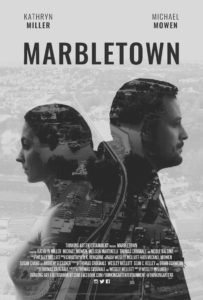Showcase Filmmaker Spotlight: Wesley Mellott
Showcase Filmmaker Spotlight: Wesley Mellott
By Travis Trew, Programming Associate
Growing up in Needmore, Pennsylvania—a city with “more cattle than people”—Wesley Mellott’s introduction to filmmaking came from watching movies and recreating them with friends. After majoring in film studies at Penn State, Mellott began making his own films and co-founded Thinking Art Entertainment, a Philadelphia-based film company that has produced a feature film and several shorts. Thinking Art’s latest short, Marbletown, is an impressively cinematic cross between relationship drama and crime thriller. It tells the story of Tim (Michael Mowen) and Molly (Kathryn Miller), a pair of criminals whose volatile relationship begins to implode when Molly attempts to strike out on her own.
PFS: What’s your role at Thinking Art, besides directing films?
W: I edit all the projects, and usually I’m the Director of Photography as well. And then I do a lot of the sound editing and sound designing as well.
PFS: What are some of the biggest challenges to getting films made as an independent filmmaker?

W: I would say finding people is one of the biggest challenges. It’s hard to find people who are as dedicated as you are. And there’s the monetary aspect as well. Everything that we shoot is just coming out of our own pockets so it gets expensive.
PFS: Have you developed a community of collaborators?
W: I just moved to the Philly area about three years ago. And it’s been kind of steadily growing to where I’ve been able to find people that are more and more interested and dedicated to helping out. For the past couple years I’ve found a group of loyal people that are willing to help out all the time.
PFS: Where did the idea for Marbletown originate?
W: The original story was called “Too Fragile,” which one of my coworkers wrote. His name is Thomas Crognale. It was a story he remembered his parents telling him when he was a little kid. It was about a guy in their neighborhood who was a crook and he and his girlfriend lived together. And the guy was just a terrible person. He was always physically and mentally abusing his girlfriend. And they stayed together for years. So it made him think about why, if someone is so terrible to you, you would voluntarily keep yourself in that situation for years. It made him think about people, the decisions they make, and what makes them stay in an abusive relationship like that.
PFS: How did you approach the characterization of Tim? We see all the terrible things that he does, and hate him to a certain extent. But we also see some of the good that Molly sees in him, at least in his better moments.
W: I think a lot of the characterization of Tim is a testament to Mike’s brilliant performance. While writing, it was hard trying to find that balance because he is supposed to be an unlikeable character, but you need to like him in a way. In order to care about the characters and the story there has to be some likability to both characters. Mike portrayed Tim with a brilliant mix of charm and repulsiveness, which really helps you understand why Molly would fall in love with a guy like him. Mike and I worked together to ensure Tim had these little moments of “redemption” to show that there are these things he does that make her happy, which helps the audience to not fully despise him.
PFS: Were geography and sense of place important to the film?
W: It was very important. We took a lot of time and carefully location scouted. One thing that was very important to me when I came on board was that we needed to have this running theme of trains, and this constant sense of transportation and of going from town to town being a major part of their lives. So we chose to shoot around a lot of train tracks and areas that were kind of dirty looking.
 PFS: What were some of your cinematic influences when you were making Marbletown?
PFS: What were some of your cinematic influences when you were making Marbletown?
W: I knew that location needed to be a character in and of itself in the movie, so I was using examples like Chinatown and Westerns where the landscape is a character in the movie. And Martin Scorcese’s movies have had a lot of influence on my work.
PFS: What was your approach to filming some of the more difficult scenes of abuse?
W: It was actually a lot easier than you’d think it would be. Katie, Mike, and I were able to rehearse some of the scenes. We were able to laugh and joke around so they would get to know each other a little bit. So they were comfortable displaying those kinds of emotions to each other. On set, even though it was pretty serious during filming, there would be a lot of joking around in between takes to ensure everyone was having fun. But I was also understanding that everyone works differently, and I made accommodations so that the actors were able to get into character. Sometimes, someone was able to go into an emotional scene without much preparation between takes, with the laughing and joking around. Other times, they would need silence or need to go off and be alone in order to get into the mindset.
PFS: This area isn’t known to be a filmmaking hub. Do you see yourself continuing to make film here? Do you see it as being something that informs your work?
W: Yeah, I do. I don’t really have any intentions of moving to New York City or California to try to get professional jobs. I don’t do this for money or fame. I do this because I love it and I want to keep telling stories that I think people will enjoy, and I don’t think I have to move out of the area to continue doing what I’m doing. I love this area. Philadelphia’s a cool city.
PFS: What projects do you have in the works now?
W: We just finished filming a short entitled The Duel. It’s a short comedy about a guy who, after his girlfriend breaks up with him, finds out that she’s in a new relationship from Facebook. So he challenges her new boyfriend to a duel to the death and the winner gets the girl. We’re a lively, fun bunch and we do all these serious movies, so we kind of wanted to test our comedy chops.
Marbletown will screen on Friday, May 5th at the Prince Theater’s Black Box as part of Philly Film Showcase, an exhibition supporting new work by talented, up-and-coming local filmmakers.